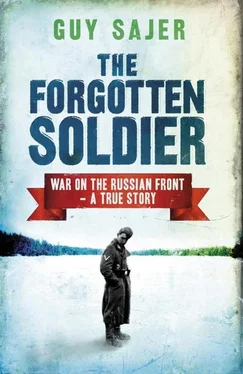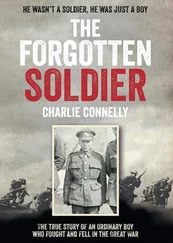The tank withdrew into the noise of battle, and finally disappeared in a volcanic eruption which lifted it from the ground in a thick cloud of smoke. Our wildly staring eyes tried to fix on something solid, but could find nothing except smoke and flame. As there were no more tanks, our madness thrust us from our refuge, toward the fire whose brilliance tortured our eyes. The noise of the tanks was growing fainter. The Russians were backing away from the stubbornness which the devil seemed to have instilled in us. We collapsed onto the icy ground, whose touch seemed gentle to our exhausted bodies.
The first three attacking tanks had been destroyed. The others, from each of which we pulled a wounded man, had been stopped. The rest had no longer wished to expose themselves to our desperate resistance. They would undoubtedly reappear in greater numbers, with the support of planes or artillery, and our despairing frenzy would count for nothing.
We were still fighting, and, although the disproportion of our strength relative to the enemy’s left us with no hope, our struggle was not in vain, because it allowed a host of civilians to escape.
During a sleepless night, other German troops joined us. We reestablished our positions, and laid down a minefield, which a fresh delivery of supplies from Danzig made possible. The mines were a powerful support for our defense, but unfortunately they were effective only once, and the Russians would certainly give the ground a preliminary going-over with a heavy bombardment.
For three days, the Russians had been launching intensive attacks toward the bay, attempting to cut off Danzig from Gotenhafen. Pferham had been seriously wounded, and once again we had been forced to give up some ground. This time, we had the invaluable support of naval artillery. If the Russians had not been there with such vast quantities of men and materiel, they would probably have been obliged to withdraw.
The remainder of our forces was concentrated on a small piece of territory. The Russians were using planes against us, and it was above all their air power which overwhelmed us in the end. As we stared toward the horizon, we could see that the slightest projection had been eliminated. The territory, in which, even six months ago, life must have had a certain regularity and sweetness, was now experiencing an apocalypse. It was no longer possible to move during the day. The sky was constantly filled with Russian planes, which, despite the heavy opposition of our anti-aircraft defenses, always returned in constantly increasing numbers. Our defenses, moreover, were continuously weakening, as the evacuation of troops began.
We were among the first to return to Gotenhafen, where certain sections of the city were already the scene of fierce combat. Within a few days, the appearance of the town had entirely changed. There were ruins everywhere, and a strong smell of gas and burning filled the air. The wide street which led down to the docks no longer had any definition. The wreckage of the buildings which had once lined it was crumbled right across the roadbed, obstructing all passage.
Along with thousands of others, we were put to work clearing away the rubble, so that trucks filled with civilians could get down to the harbor. Every five or ten minutes, planes came over, and we had to freeze where we were. The street was strafed and burned twenty or thirty times a day. Only our memories of Belgorod and Memel kept us from killing ourselves. We were no longer counting our dead and wounded: almost no one was entirely unhurt.
Heavily laden horses, which must have been spared by Supply, pulled a continuous train of sledges loaded with bodies wrapped in sacking or even paper. They had to be collected and buried with a speed which rivaled that of the Ilyushins ’ machine guns.
Exhausted people stood stunned and motionless on heaps of ruins, creating magnificent targets for Russian planes. As a finishing touch, the horizon to the west and southwest was reddish-black. House — to house fighting had already begun in the outlying sections of the town, while thousands of civilians still waited down by the docks. From time to time, Russian shells reached as far as the embarkation area, and exploded there.
We were trying to snatch a short rest in a cellar, where a doctor was delivering a child. The cellar was vaulted and lit by a few hastily rigged lanterns. If the birth of a child is usually a joyful event, this particular birth only seemed to add to the general tragedy. The mother’s screams no longer had any meaning in a world made of screams, and the wailing child seemed to regret the beginning of its life. Once again, there was streaming blood, like the blood in the streets, and on the earth, where we had known so much suffering, and where my appreciation of existence was continually spiraling down toward the abyss whose depths I occasionally glimpsed, defining life as a mixture of blood and suffering and groans of pain.
A short while later, after a last look at the newborn child, whose tiny cries sounded like a tinkle of delicate glass through the roar of war, we returned to the flaming street. For the child’s sake, we hoped he would die before he turned twenty. Twenty is the age of ingratitude. It is too hard to be leaving life at the moment when one so much longs for it to flower.
We helped some old people, whom younger ones had left to the mercy of the Soviets. In the darkness lit up by flames, we once again performed our duty. We supported and carried the old people down to the port, where a boat was waiting for them. Planes passed over, and in spite of the blazing fires which lined the street, they once again scattered their load of death.
They killed some fifteen of our number. We had tried to pull the victims down with us on our several rapid plunges to the ground, but the old people were unable to follow us. It didn’t matter though we saved a good many of them anyhow, finally hoisting them onto a trawler, after getting them through the thickly packed crowd. The boat had to slip its lines while loading, to escape an aerial attack.
As we moved away from the shore, Wollers ran back to the stern to see if the gangplank had really been drawn in. Then he came back to us, tramping through the refugees who crowded the deck. He looked at us as if he were about to speak. Then we all turned to stare at the flames.
“Do you still have your embarkation cards?” he asked suddenly.
We all pulled out our tattered, filthy cards.
“I would have lost my head first,” muttered Grandsk.
The water slid quietly by, less than a yard below us. The boat would probably sink if the weight of its human cargo shifted. No one moved so much as a finger. Once again, we had escaped from the Russians and their fury.
Hela — Denmark — Kiel — The English Prisoner
Before daybreak, we arrived at Hela, without incident. We had passed several ghostly ships, navigating without lights, going back to Hela, or to Gotenhafen, and Danzig, where large numbers of civilians were still waiting for deliverance. Hela, which I had thought of as a large town, proved to be only a village, with a harbor of very secondary importance. Many ships were anchored off shore, and small boats were delivering a steady stream of passengers fleeing to the West.
We had scarcely set foot to the ground when the police, who were still functioning, made us step to one side. We stared at them with desperate unease. Was our good luck, which had brought us this far, going to melt like summer snow and send us back to Danzig, or Gotenhafen? The police turned their backs on us to direct the white-faced civilians. In any event, all of our papers were in order. But wasn’t that the ship which was to take us further? And mightn’t a counter-order arrive any moment? The minutes went slowly by, without giving us any glimpses into our future.
Читать дальше












